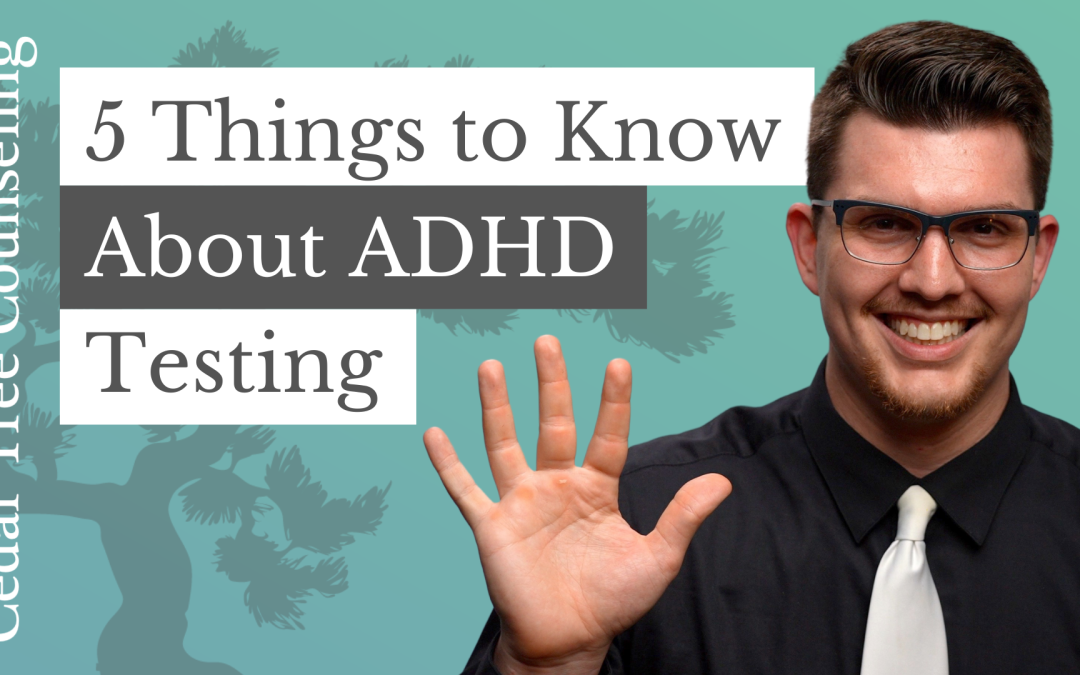Right now, studies show that about 2.5% of adults and 5% of children in the United States have ADHD. That’s 1 in 40 adults and 1 in 20 children. That’s a lot.
These high numbers suggest that a lot of people don’t know they have ADHD or think they have ADHD but haven’t been tested for it. This is a problem because many practitioners will not provide ADHD medication unless a person has been tested and diagnosed.
I’m Nicholas Amitrano, and I am a therapist at Cedar Tree Counseling. I am also a neuropsychologist-in-training who has met, worked with, and tested many teens and adults with ADHD. Today, I am going to talk about 5 things to know about ADHD testing to help you decide if ADHD testing is something you want and if it is right for you.
We do not offer ADHD testing at Cedar Tree Counseling. Rather, we created this video as a tool to help our patients in their decision to pursue testing if needed.
ADHD Testing May Be Covered By Insurance
First, many insurance companies will cover neuropsychological testing as long as it is “medically required,” meaning as long as you meet a significant amount of ADHD criteria.
It may not be worth pursuing ADHD testing if you have only a few symptoms because then your insurance company may not deem it medically necessary and you will have to pay out of pocket.
ADHD Testing Involves Several Different Types of Tests
Second, ADHD testing involves a couple of interviews, some questionnaires, and paper/pencil tests.
The paper/pencil testing portion tends to be a bit complex, so expect to test with the neuropsychologist for about 4 to 5 hours. Pack lunch. Bring some snacks. Be sure to stay hydrated.
ADHD Testing Doesn’t Involve Machinery
Third, ADHD testing does not involve machinery. No MRIs. No CaT scans. Instead, the paper/pencil tests act as a sort of “brain workout.”
What this means is that the neuropsychologist will “exercise” some of your thinking abilities to help determine if how you think coincides with ADHD.
Be Sure to Self-Examine
Fourth, be sure to self-examine before you decide to pursue testing.
Many times, people are experiencing problems such as anxiety, depression, stress, trauma, substance misuse, or some other psychological issue that is causing difficulties with concentration, low attention span, a hard time planning and organizing, or behaviors that seem like hyperactivity. It is not always ADHD that is the problem.
Follow Up with Your Neuropsychologist to Go Over Your Test Results
Fifth, your neuropsychologist will choose a time to sit down with you to go over your test results, usually 2 to 4 weeks after testing. During this time, your neuropsychologist will also give you your diagnosis (if it applies to you) and will provide recommendations for a treatment plan.
If you believe that ADHD testing is right for you, then tell your therapist so that they can make a referral to a nearby practice that offers ADHD testing. While you wait, be sure to continue therapy with your therapist so that the two of you can begin to create a treatment plan for the symptoms you are experiencing in the meantime.
And if you need extra support managing your ADHD symptoms, schedule an appointment with us today. We’re here to help.

Nicholas Amitrano
Adolescents and Adults
I have seen firsthand how fear- and anxiety-provoking counseling can be. That’s why I make a safe space for you to process what has happened before so that you can become healthier now.
Choose A Topic!
Cedar Tree's Mission:
There are a lot of broken families who struggle to do life well together.
That’s why we help families create an environment where deeper connection & healing can happen.


